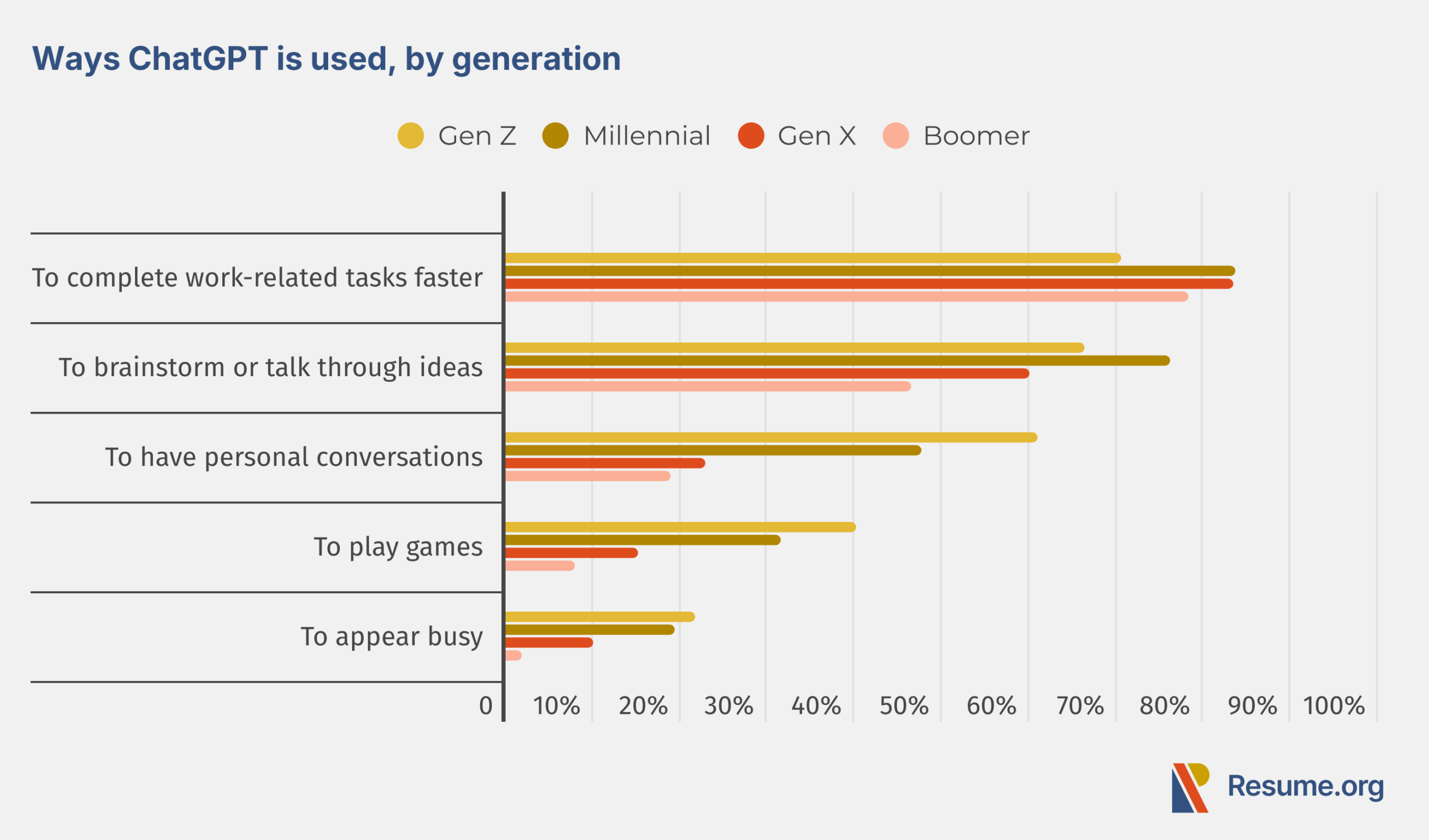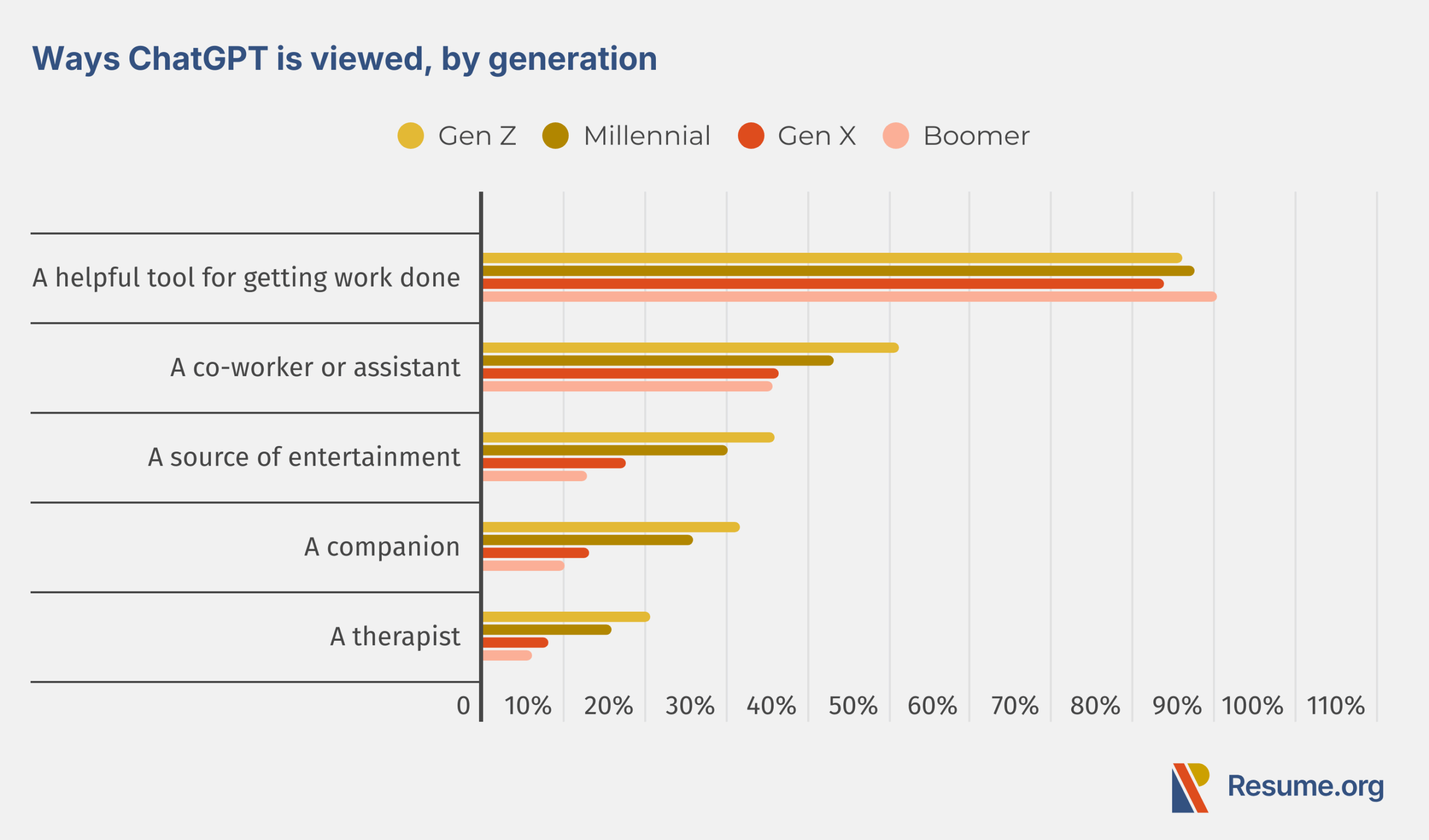In an age where artificial intelligence is transforming the workplace, Gen Z is leading the charge. New survey data from Resume.org of 8,647 full-time U.S. workers reveals that younger workers are embracing ChatGPT and integrating it into their daily work lives in ways older generations have yet to match.
From task assistance to idea generation, ChatGPT is becoming a digital teammate and even a friend for many Gen Z professionals.
Highlights:
- 11% of workers use ChatGPT regularly; Gen Zers are twice as likely to use the tool (21%)
- Workers use AI to make tough decisions, get advice, and seek mental support
- Many Gen Z users view ChatGPT as a co-worker or even a friend
- Nearly half of workers using ChatGPT rely more on it than their boss
1 in 5 Gen Z Workers Use ChatGPT Regularly
While just 11% of all workers say they use ChatGPT during a typical work week, Gen Z uses the tool at a significantly higher rate. One in five (21%) Gen Z workers report using ChatGPT regularly, making them the most active users by generation. Millennials are not far behind, with 15% saying they use the tool consistently.
Usage declines sharply among older generations. Only 9% of Gen X and just 6% of Boomers report regular ChatGPT use. This generational divide underscores a clear trend; younger workers are significantly more comfortable adopting AI tools like ChatGPT, while older workers remain more hesitant to integrate them into their daily routines.
 “Gen Z entered the workforce at a time when AI tools like ChatGPT were already becoming mainstream,” says Resume.Org’s Career Coach Irina Pichura. “They see it not as a threat, but as a tool that enhances productivity and even offers real-time support throughout the day.”
“Gen Z entered the workforce at a time when AI tools like ChatGPT were already becoming mainstream,” says Resume.Org’s Career Coach Irina Pichura. “They see it not as a threat, but as a tool that enhances productivity and even offers real-time support throughout the day.”
Workers Are Having Personal Conversations and Playing Games With ChatGPT
While many workers turn to ChatGPT for productivity and creative support, its uses often extend beyond just getting work done. The majority of users (82%) say they use the tool to complete work-related tasks more efficiently, making this the most common use case. Another 66% use ChatGPT to brainstorm or talk through ideas.
But ChatGPT isn’t just a professional assistant. It’s also becoming a source of casual interaction. More specifically:
- 37% of users say they engage in personal conversations with ChatGPT.
- 24% use it to play games.
- 14% admit they use it simply to appear busy when they don’t have anything else to do.
Gen Z workers stand out across nearly all of these use cases. They’re significantly more likely than older generations to treat ChatGPT as a multi-purpose tool—one that blends work with personal engagement. In fact, about 1 in 5 Gen Zers report spending an hour or more chatting with or playing games on ChatGPT during the workday.

Workers use AI to make tough decisions, get advice, and for mental support
Among workers who say they engage in personal conversations with ChatGPT, many are using the tool for meaningful advice and support. The most commonly discussed topic is help with tough decisions, cited by 38% of this subgroup.
These users also frequently seek:
- Advice on hobbies or personal interests (32%)
- Career guidance (29%)
- Personal finance support (27%)
- Entertainment recommendations (26%)
Beyond practical topics, a significant number turn to ChatGPT for emotional and interpersonal support:
- 22% discuss challenges with coworkers
- 20% talk about mental health or emotional struggles
- 18% use it to vent about things bothering them
- 15% seek help with relationship issues outside of work
These findings reveal that for those using ChatGPT in a more personal way, the tool has become a hybrid source of both advice and emotional relief during the workday.
“For some users, ChatGPT has become more than just a productivity tool. Whether they’re working through a tough decision, venting about a bad day, or seeking guidance on personal matters, it’s clear that many workers, particularly younger ones, are using AI to fill a gap in support they may not find elsewhere,” says Pichura.
Gen Z Sees ChatGPT as a Co-Worker or Even Friend
The data reveals that Gen Zers are more likely to anthropomorphize ChatGPT.
Most workers view ChatGPT as a valuable productivity tool, with 86% saying they use it to get work done more efficiently. However, 41% consider it a co-worker or assistant, while others describe it as a source of entertainment (24%), a companion (20%), or even a therapist (12%).
Millennials closely mirror the overall trend, with 87% calling it a helpful tool, 43% viewing it as an assistant, and around 30% using it for entertainment. A smaller share of millennials see ChatGPT as a companion (26%) or therapist (16%).
Gen Z workers, however, are notably more likely to personify ChatGPT. While 86% of Gen Zers also see it as a helpful tool, over half (51%) view it as a co-worker or assistant. They are also more likely than any other age group to describe it as a source of entertainment (36%), a companion (32%), or a therapist (21%).

Half of Gen Z Workers Say They’d Rather Ask ChatGPT Than Their Boss
Overall, 40% of workers say they rely more on ChatGPT than their boss to answer questions.
Compared to the overall workforce, both Gen Z and millennials are more likely to view ChatGPT as a preferred resource over traditional managerial support. Nearly half of Gen Z respondents (49%) say they definitely or probably rely more on ChatGPT than their boss, and Millennials show similar trends, with 47% saying they definitely or probably depend more on ChatGPT.
“Gen Z workers have grown up with instant access to information, so it’s no surprise they turn to AI before turning to a manager,” says Pichura. “For them, ChatGPT offers fast, judgment-free answers, which can feel more efficient and comfortable than approaching a supervisor, especially in remote or high-pressure environments.”
Methodology: Resume.org commissioned this survey, which was conducted via Pollfish in May 2025. A total of 8,647 full-time U.S. workers participated.
To view all of our other research and studies go to our research page.
Resume.org offers free, HR approved resume templates to help you create a professional resume in minutes. Choose from several template options and even pre-populate a resume from your profile.